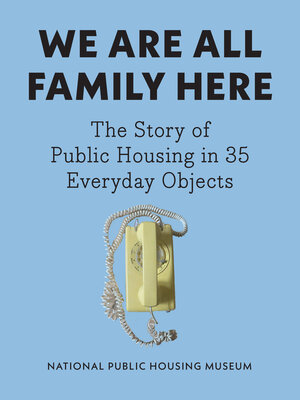We Are All Family Here
ebook ∣ The Story of Public Housing in 35 Everyday Objects
By National Public Housing Museum

Sign up to save your library
With an OverDrive account, you can save your favorite libraries for at-a-glance information about availability. Find out more about OverDrive accounts.
Find this title in Libby, the library reading app by OverDrive.



Search for a digital library with this title
Title found at these libraries:
| Library Name | Distance |
|---|---|
| Loading... |
Over the past century, more than 10 million people across the nation—including well-known figures from Barbra Streisand to former Chicago DA Kim Foxx—have called public housing home, yet since the 1990s, thousands of public housing units across the United States have been demolished. Today, housing insecurity is one of the most pressing social issues facing the nation.
Building on an exhibit at the brand-new National Public Housing Museum, We Are All Family Here is designed to help facilitate national dialogue about the history and importance of public housing through the intimacy of residents' memories of prized, and ordinary, everyday objects.
The book will include full-color photos of over two dozen objects—from a championship boxing belt owned by Lee Roy "Solid Gold" Murphy and the leather motorcycle jacket of legendary Cabrini-Green organizer Marion Stamps, to a camera, a Pyrex dish, and a wedding dress—along with photos of the individuals who have provided them, as well as brief essays by the objects' owners, describing each object's significance with respect to the time the owner resided in a public housing building. The book also includes essays by experts on housing and homelessness in America.
Together, these objects will tell both the beautiful and troubled history of public housing, and the diverse experiences of those who have survived and thrived in those communities.







